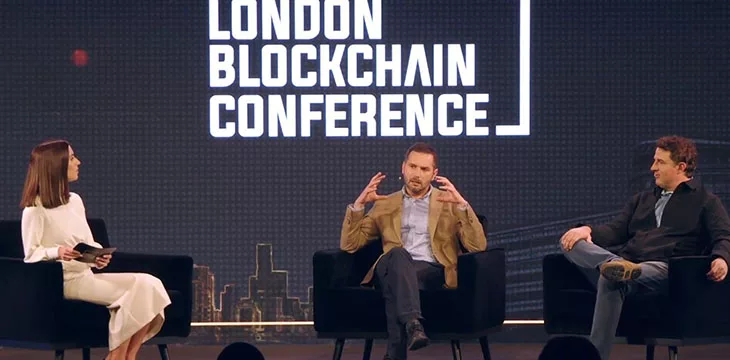|
Getting your Trinity Audio player ready...
|
Permissioned versus permissionless blockchains have been a big debate over the years, especially for enterprise needs. On Day 2 of the London Blockchain Conference, Billon COO Robert Kaluza and Rad NFTV CEO Tony Mugavero discussed the benefits and trade-offs and why they settled on the solutions they use in their businesses.
The Billon Group operates a permissioned blockchain network targeting enterprises for data exchange, tokenization, and identity, Kaluza told the audience. With most of its operations being in Europe, it has worked with the likes of Microsoft (NASDAQ: MSFT), Phillip Morris, and more.
Regulatory compliance is one of the key reasons the company settled on permissioned blockchain (although it’s worth noting that BSV blockchain was built with compliance in mind).
“If you want to identify your users, where they are sending assets, who produces these assets, permissioned is the way to go,” Kaluza noted.

Digital assets today are mostly traded on centralized exchanges controlled by a single entity. “Majority of users are already used to this permissioned structure,” Kaluza added.
Mugavero countered that permissionless blockchains like the BSV blockchain provide users with a censorship-resistant network and real ownership of their assets.
“We’re a big believer in the underlying protocol being permissionless and then putting the permissions as a Layer 2 application,” he stated.
Even with centralized exchanges, users have the choice of taking out their digital assets to another platform, as their bitcoin is on a permissionless network where no central entity can take away access.
The two panelists agreed that users must have ownership and control of their data, regardless of the permission structure of a network.
Permissioned vs. permissionless blockchains: What to consider
Capital is a key factor for enterprises as they consider what kind of blockchain permission structure they want to integrate. Public blockchains are battle-proven; they’ve faced attacks and warded them off, with thousands of nodes, are as strong as they can be, according to Mugavero. There are also hundreds of tools that make it seamless to integrate these networks into business systems. Permissioned blockchains lack this and require much more capital to integrate.
Security is also critical. Public blockchains like BSV blockchain are nearly impossible to hack. However, smaller private blockchains are more susceptible to having a single point of failure.

Energy efficiency has become a significant consideration as the world becomes more environmentally conscious. Permissioned networks come out tops on this metric, according to Kaluza, who noted that Billon’s network could even run on mobile phones. He believes that BTC’s massive energy consumption has tainted the image of public blockchains, even the more energy-efficient networks.
However, Mugavero noted that the BSV blockchain has proven public networks can be efficient by putting hundreds of thousands of transactions in a single block. He also believes it will improve—“I’m sure the first gasoline-powered car was nowhere near as efficient as a Tesla.”

Scaling is emerging as the best solution to energy consumption for blockchain networks. Those that fail (or refuse) to scale like BTC continue to burn through enough energy to power a mid-sized country, only to process half a million transactions a day.
By scaling massively, BSV has proven it can process millions of transactions a day. It recently set a new world record by hitting 86 million transactions in 24 hours; this translated to 560,000 transactions per block and over 800 per second. The fees remained steady at $0.000009 despite the rapid surge in transactions.
Watch: London Blockchain Conference Day 2 highlights

 02-17-2026
02-17-2026 




